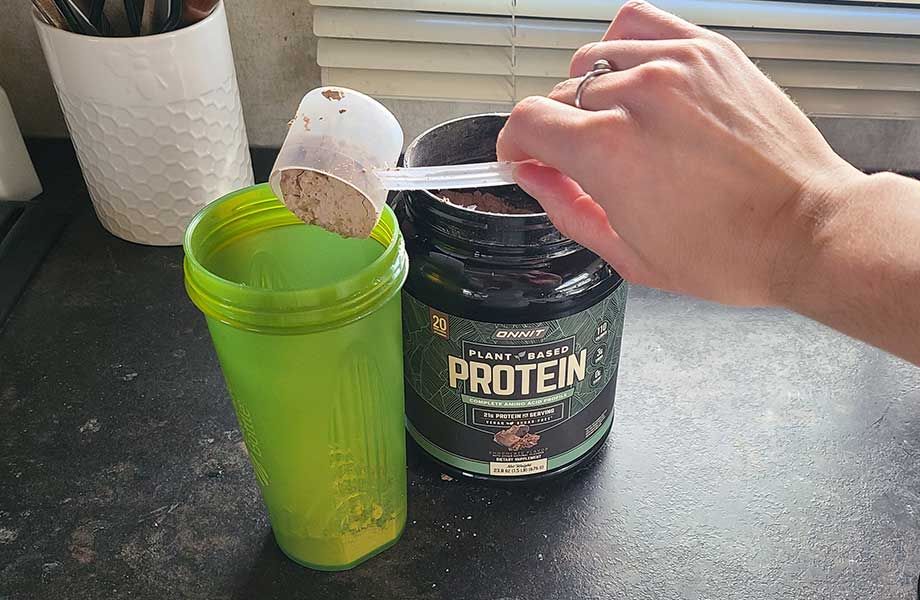We test and review fitness products based on an independent, multi-point methodology. If you use our links to purchase something, we may earn a commission. Read our disclosures.
Plant-based protein fans are accustomed to having to give up something in order to get their gains. In many cases, it’s a subpar amino acid profile that demands consuming multiple (often expensive) servings just to get to a measly 20 grams of protein. In other cases, it’s taste or texture that can’t quite match dairy or egg protein. And if you have additional needs like gluten-free or soy-free, well, expect to search for a while.
The supplement and workout juggernaut Onnit built its plant-based protein to check every big item on your vegan protein wishlist, with some special additions to help this be the best-tasting plant-based protein you’ve ever had.
Does Onnit deserve to be included in the best vegan protein powder conversation with big hitters like Vega, Orgain, and Garden of Life? Our Onnit Plant-Based Protein review will let you know if this is a legit contender to whey, or just a plant-based pretender.
Medical disclaimer: This article is intended for educational and informational purposes only. It is not intended as a substitute for medical advice. For health advice, contact a licensed healthcare provider. GGR also recommends choosing a product that has been third-party tested for quality.
We Take Plant-Based Protein Seriously
Garage Gym Reviews’ team of testers includes high-end athletes, coaches, and nutritionists who can spot a high-quality protein when they see and taste one. We know what makes a complete protein, but also what makes a protein that you’ll completely fall in love with. The labels, the taste, the texture—everything matters to us, because we know it matters to you.
Onnit Plant-Based Protein
Onnit Plant-Based Protein
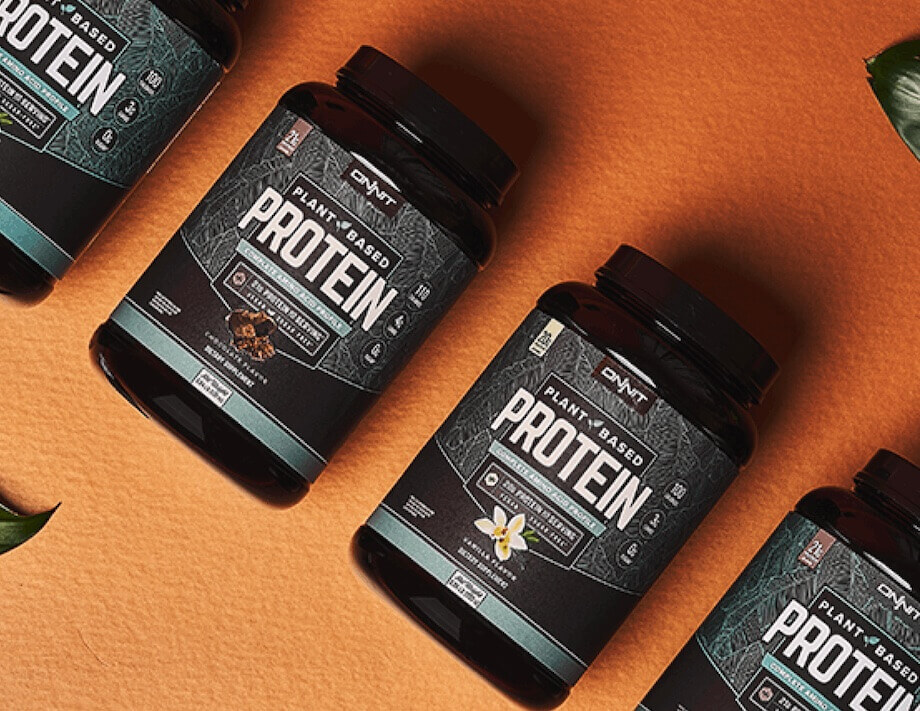
Product Highlights
- Pea-, pumpkin-, sunflower-, and watermelon-seed protein powder
- Vegetarian and vegan
- Dairy-, soy-, and gluten-free
- Available in chocolate and vanilla
Pros & Cons
Pros
- Informed Sport-certified
- Vegan
- Dairy-, soy-, and gluten-free
Cons
- Vanilla flavor is poorly reviewed
- Only 20 servings per container; customers want larger serving size tubs
- Some reviewer complain it doesn’t mix well
Bottom Line
Onnit’s Plant-Based Protein mixes a variety of protein sources. Customer reviews are much more positive for the chocolate flavor.
A Quick Look at Onnit Plant-Based Protein
Austin-based Onnit has carved out a unique training niche with its fast, flow-based training using unconventional implements like steel clubs and kettlebells. But nutritionally, the company cuts just as distinctive a path, with products that steer clear of the fitness industry’s “bigger, leaner, more caffeinated” cliches. Case in point: Onnit’s immensely popular Alpha Brain nootropic, and the non-caffeinated pre-workout Total Strength & Performance, both of which made our list of the best pre-workouts.
To be clear, Onnit does some make some “normal” muscle growth supplements, like its well-reviewed grass-fed whey protein and creatine monohydrate. And the longstanding Hemp Force protein is a personal fave—especially the chocolate flavor.
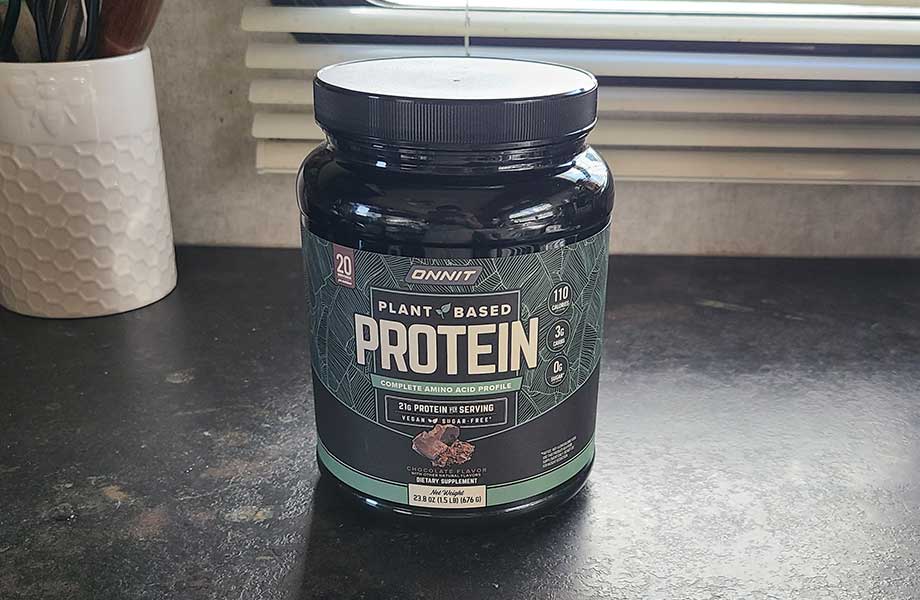
But Onnit Plant-Based Protein is the brand’s most notable attempt to make a vegan blend that meets the upper end of the International Society of Sports Nutrition’s protein recommendation of 700 to 3000 milligrams of leucine per scoop.
In other words, this is vegan protein powder for athletes who are serious about their protein.
RELATED: Best Protein Powder
Before You Buy
- This vegan protein powder is a complete protein from multiple protein sources: Pea protein, pumpkin seed, sunflower seed, watermelon seed
- It contains no artificial sweeteners and is flavored with monk fruit
- Onnit’s high quality doesn’t come cheap
Is Onnit Plant-Based Protein Worth It?
If you’re looking to boost your daily protein intake with the least amount of hassle possible, picking protein supplements with at least 20 grams per serving is a good goal. Onnit achieves it in a single scoop, thanks to a blend of plant-based concentrates (no protein isolate here). However, the fat, carb, and overall calorie content per serving are still remarkably low. This is about as lean and clean as veggie protein gets.
Great for:
- A plant-based diet that still factors in grams of protein
- Protein powder for weight loss or body recomposition goals
- Adding some heft to smoothies
Not recommended for:
- Lifters married to their less-expensive whey protein
- Folks chasing maximum muscle gain via multiple protein shakes per day
- Anyone who wants something other than chocolate or vanilla flavor
Onnit Plant-Based Protein Specs
| Price per serving | $2.25 |
| Serving size | 20 g |
| Flavors | Vanilla, chocolate |
| Type of protein | Pea protein concentrate, pumpkin seed protein powder, sunflower seed protein powder, watermelon seed protein powder |
| Calories | 100-110 |
| Protein content | 20-21 g |
| Carb content | 3 g |
| Fat content | 1-1.5 g |
| Third-party tested? | Informed Sport |
| Sweetener | Stevia, monk fruit extract |
Experience Using Onnit Plant-Based Protein
Onnit has clearly spent a lot of time and money crafting a vegan protein powder that speaks to a wide array of athletes and ethical priorities. The carb count and lack of added sugar makes it appropriate for keto and low-carb dieting, while the added L-leucine makes it a legit post-workout refueling option. Onnit even claims on its site that the protein is “earth-friendly and sustainable,” though it’s not exactly clear what that means to them.
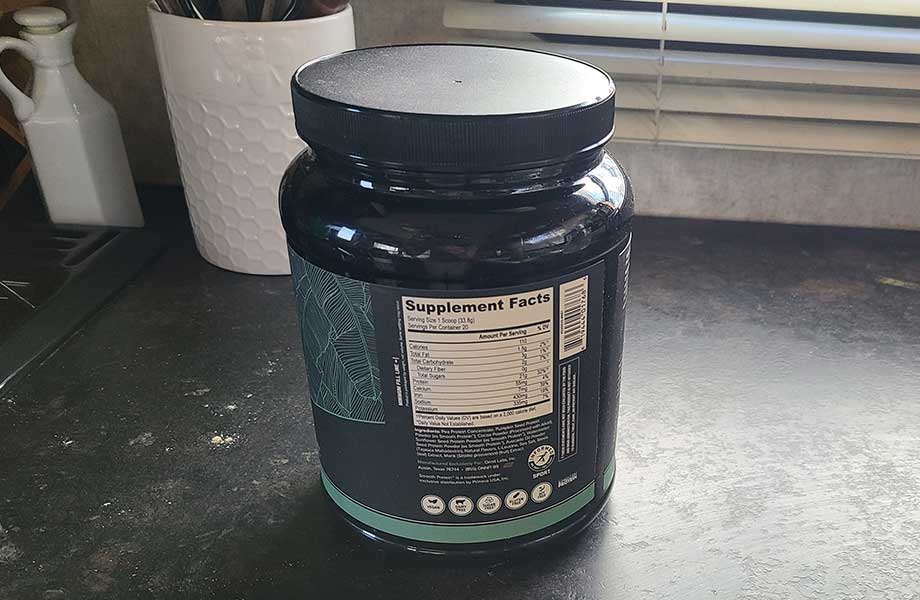
Which is all great…as long as it tastes good enough that you’ll be excited to drink the same two flavors over and over. Remember, this and all other dietary supplements only work if you take them repeatedly, for weeks and months on end.
So does it? Actually yes, says our tester, Garage Gym Reviews editor Frieda Johnson. “I’m surprised at how much I like this, as most vegan chocolate proteins are disappointing, in my experience” Frieda reports. “This actually tastes quite a bit like a dairy-free chocolate milk I used to get.”
Price Per Serving
Nothing Onnit makes can be considered a “budget” product. If you’re familiar with the brand, you know that going in. At $2.25 per serving, it’s notably more expensive than most whey proteins and many other vegan protein powders. But the simple ingredient list, lean macros, and high-quality protein will appeal to many athletes.
And if you’re comparing this protein on a dollar-for-gram basis against, say, Optimum Nutrition 100% Whey Gold Standard it’s never going to win. But news flash: it’s not trying to.
RELATED: Onnit Coupon Codes
Formulation
Onnit provides an in-depth breakdown of the essential amino acid distribution on the label and on their website, as well as how its leucine and BCAA content match up with other proteins—including their own Grass-Fed Whey Protein.
Spoiler alert: it compares very well, scoop for scoop. Because it comes from a blend of vegetable proteins rather than a single source, it offers significant amounts of all nine essential amino acids. Look a bit down the ingredient list, and you’ll see added L-leucine, bringing the per-scoop leucine content to 2.27 grams.
That’s up there with the best protein powders for muscle gain, which all run between 2 and 3 grams per scoop.
Taste and Solubility
Onnit’s formula includes several ingredients included to help the taste and mixability of the protein. Avocado powder adds a fatty creaminess and mouthfeel, while the seed-based Smooth Protein improves solubility and texture. Frieda noticed the difference immediately:
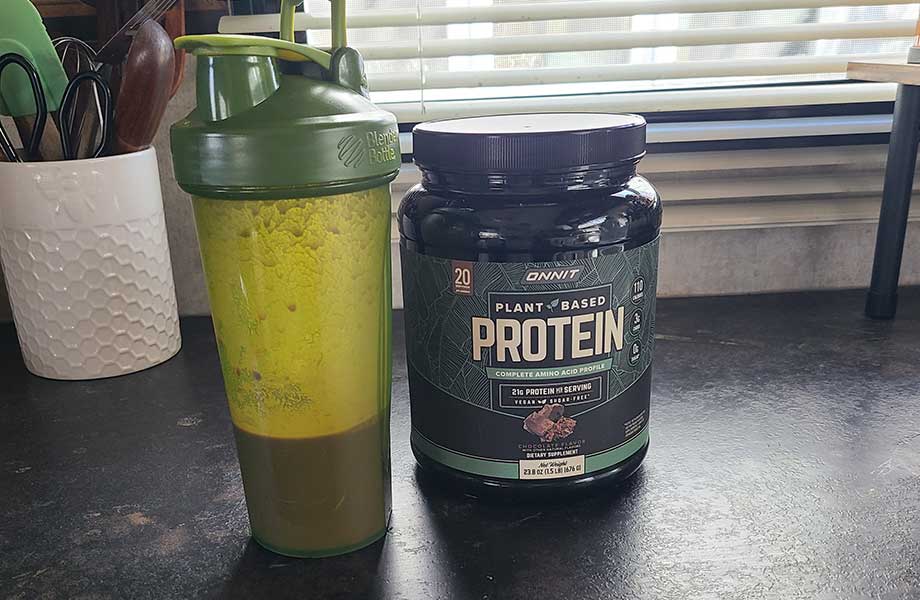
“I haven’t had real milk in a very long time so I don’t necessarily know how this compares, but I will say that this was richer, creamier, and less watered-down tasting than many other vegan chocolate protein powders I’ve tried,” she reports. “I mixed one scoop with 8 ounces of water and it was a little thin but blended well, with no lumps or settling. It had a very faint gritty texture, but overall was not unpleasant.”
Side Effects
No studies have indicated that consuming plant-based protein on a regular basis puts you at risk of side effects.
That said, many of the most popular plant-based proteins also contain a heaping helping of prebiotic fiber, which a study in Neurogastroenterology & Motility2 from 2017 found can cause gas, stomach pain, and bloating lasting a few days while your body adapts to the increased fiber intake.
One thing that really stands out when eyeballing Onnit Plant-Based Protein’s label is the near-total lack of fiber. This makes it a great choice for before or after a workout, when you want something light and easy to digest in your stomach.
Third-Party Testing
Onnit Plant-Based Protein and all Onnit products are verified to be safe and accurately labeled by Informed Sport, one of the most stringent and well-established third-party testing certifications for sports supplements.
Comparison to KOS Plant Protein
KOS Plant Protein
KOS Vegan Protein Powder
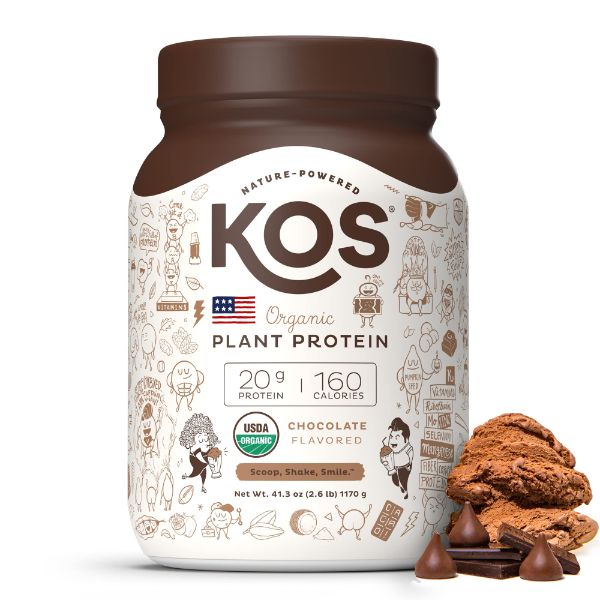
Product Highlights
- Multi-source vegan protein powder
- USDA-certified organic, soy-free, gluten-free, dairy-free, non-GMO
- Digestive support via DigeSEB to help maximize absorption
Pros & Cons
Pros
- Manufactured in the USA
- Superfood-infused
- 20 g protein per serving
- Chocolate flavor is rich
- Enhanced with digestive support enzymes
- Under $1.50 per serving
Cons
- Customers say it has a gritty/chalky flavor
- Some users reported protein gave them stomach issues
- Reports of strong sweetness and bad aftertaste
Bottom Line
KOS is a vegan protein with a lot of positive reviews, but a number of people experienced stomach issues using this protein powder.
KOS Plant Protein won a spot in our guide to the best vegan protein powders, but Onnit matches or bests it in almost every category. Both proteins deliver the same 20 grams per one-scoop serving, but Onnit does it in 60 fewer calories, with only 1 gram of fat (vs 6 grams in KOS) and 3 grams of carbs (vs 9 grams).
To be clear, none of that makes it a better protein. It just means that it’s likely to sit lighter in your stomach, which can be a big plus before or after an intense Onnit-style kettlebell beatdown. KOS also includes an organic fruit and vegetable blend, while Onnit takes a “just the protein and nothing but” approach.
The price per serving is a big difference, as Onnit comes in $.75 per scoop higher. If you subscribe to Onnit’s semi-regular protein delivery, you can get that down to about a $.40 difference.
Is Onnit worth the extra dough? That’s for you and your stomach to decide. I’ll simply note that our KOS reviewer, GGR performance editor Anthony O’Reilly, noticed stomach rumblings after consuming his protein, while our Onnit reviewer, Frieda Johnson, noticed nothing but the great taste.
Learn more about this plant-based product in our full KOS Vegan Protein review.
Customer Experience
If you purchase Onnit products from third-party vendors and want to return them, the company requires you to work with the store you purchased from.
However, if you purchase supplements directly from Onnit, they offer a generous return policy, which allows you to return any supplement as long as it is at least half full.
Ordering Onnit Plant-Based Protein
Onnit offers free shipping on orders over $150, as well as a rewards program that allows you to earn discounts and access to exclusive products. If you subscribe to receive a new tub of Onnit Plant-Based Protein, the per-serving price drops to $1.91. The brand offers numerous subscription options: every 7, 15, 20, 30, 45, 60, or 90 days.
Customer Reviews
Onnit Plant-Based Protein has 136 reviews on the brand’s site, with an average rating of 4 out of 5 stars. Reviewers love the mixability, and tend to recommend blending the protein with almond or other nut-based milks.
A typical review from, sigh, DudeManBroGuy reads: “I’ve never had an issue with mixing and every time I enjoy a shake I get a free trip to flavor town because the chocolate flavor is absolutely dank!”
Final Verdict of Our Onnit Plant-Based Protein Review
Onnit Plant-Based Protein systematically targets every “but” that holds athletes back from embracing vegan protein powders—except the price, of course. If you’re willing to pay for it, it’s a versatile and clean nutritional ally in your quest for muscle gain, weight loss, and overall athletic performance.
Onnit Plant-Based Protein Rating
Onnit Plant-Based Protein
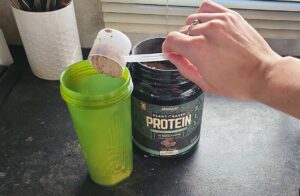
Has this popular brand finally achieved the dream of a creamy, dreamy, vegan protein with legit amino content? Our Onnit Plant-Based Protein review gives the honest truth.
Product Currency: USD
Product Price: 38
Product In-Stock: InStock
4.2
Onnit Plant-Based Protein FAQs
Is plant-based protein actually good for you?
Plant-based protein is every bit as good for you as dairy-based protein, on both the macro and micro level. And it supports muscle growth just as well, too. A randomized controlled trial published in the journal Nutrition3 in January 2023 showed that a multi-source protein blend similar to Onnit Plant-Based Protein produced muscle protein synthesis similarly to a milk-based protein. In other words, no, you’re not risking your gains!
Which is the best plant-based protein?
Onnit Plant-Based Protein delivers a solid 20 grams of protein per scoop, at a minimal 100 calories, with no added sugar and a very clean ingredient list. That’s tough to beat! If you want more flavor options, check out other plant-based proteins in our Best Pea Protein Powder roundup.
What are the disadvantages of plant-based protein?
Some plant-based proteins aren’t complete proteins, because they lack significant amounts of one or more essential amino acids. Onnit Plant-Based Protein overcomes this problem by blending multiple protein sources, and adding extra amounts of a plant-derived version of the anabolic amino acid L-leucine.
Is plant-based protein powder worth it?
If you train hard or have muscle gain or weight loss goals, plant-based protein can help deliver maximum results from your workouts—and the recovery between them. It’s often more expensive than dairy-based protein, but if you have other ethical, nutritional, digestive, or environmental reasons for going plant-based, those could very well be worth the extra money.
These statements have not been evaluated by the Food and Drug Administration. This product is not intended to diagnose, treat, cure, or prevent any diseases.
References
- Jäger R, Kerksick CM, Campbell BI, et al. International Society of Sports Nutrition Position Stand: protein and exercise. J Int Soc Sports Nutr. 2017;14:20. Published 2017 Jun 20. doi:10.1186/s12970-017-0177-8
- Mego M, Accarino A, Tzortzis G, et al. Colonic gas homeostasis: Mechanisms of adaptation following HOST-G904 galactooligosaccharide use in humans. Neurogastroenterol Motil. 2017;29(9):10.1111/nmo.13080. doi:10.1111/nmo.13080
- Pinckaers PJM, Kouw IWK, Gorissen SHM, et al. The Muscle Protein Synthetic Response to the Ingestion of a Plant-Derived Protein Blend Does Not Differ from an Equivalent Amount of Milk Protein in Healthy Young Males. J Nutr. 2023;152(12):2734-2743. doi:10.1093/jn/nxac222
Further reading

When it comes to fitness, you know we got your back! Check out our expert-selected list of the best exercises for upper back! Read more

Get a great workout with our trainer-recommended kettlebell flow to improve your grip strength and conditioning and to burn unwanted fat. Read more

Garage Gym Reviews collaborated with Jacob Penner, USA Weightlifting Level 1 Coach, NCSA Certified personal trainer, and CrossFit Level 1 Trainer to give expert advice on this topic.Hey everyone! Coop here from Garage Gym Reviews. With the home gym community growing, so many people want to get started but have limited equipment and a great place to start is with free weights as they are an extremely useful tool for achieving a wide variety of different workout goals.So, I sat down with my friend and USA Weightlifting certified coach, Jacob Penner, to deep dive on how to use free weights for total body movement.In this guide, we detail the movement patterns to structure your workouts around, which weights to buy, and because we’re two cool guys, we even included two free weight only workouts to get you started. Let’s dive right in. Read more

Ski jumps build muscle in your lower body and improve your cardio fitness. A personal trainer explains how to do them with proper form and mistakes to avoid. Read more

